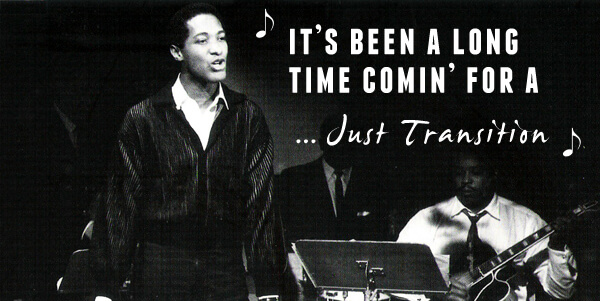
July 28, 2014
Steven D. Low
I’m an aspiring Buddhist. Something we really enjoy thinking about when we’re meditating (imagine incense, chanting, levitation—the usual) is the topic of change. Everything is changing: our identities, our relationships, our communities, and our climate.
This post is the namesake of Sam Cooke’s classic 1964 composition (listen here). A Change is Gonna Come gave voice to the courageous transition towards racial and economic justice long denied to a large portion of the citizenry. This just transition was made possible by those communities most disenfranchised by society. The voice of Sam Cooke is just as prescient today.
‘Transition’ is often a word of choice among my lefty/Buddhist associates. There are many ways to denote change. The question before us now: whose change, whose transition?
It’s been a long time comin, but a change gonna come, oh yes it will.
The petroleum industry becomes dirtier as it reaches towards the bottom of the barrel to extract the final drops of fossil fuels. And the economic benefits? Well, remember that Christmas gift packed in a box that was bigger than you? And inside was something better suited as a stocking-stuffer?
In California, out of ten industrial sectors surveyed, the fossil fuel industry was dead last as a job provider. From the site of extraction, along thousands of miles of train tracks, to the refinery, the health and safety of residents and workers, and the stability of our climate takes a steeper descent.
Will we choose to maintain our free-fall into an era of climate chaos? Or will we choose a Just Transition toward clean energy that powers a green economy, where thousands of green careers are generated; where public monies are no longer bled into the electoral war-chests of the 1%, but are instead invested in the health, infrastructure, and environment of our communities.
A Just Transition towards clean energy and a renewed economy is on the move, thanks to CBE and visionary allies. By 2025 one million Californians could be driving electric vehicles, shutting off a source of particulate pollution especially prevalent in low-income communities of color. Green careers and green energy are being produced in Los Angeles, right now, as residential buildings transform their rooftops into solar power plants. More municipalities are joining Community Choice Aggregation, where local governments secure clean energy as a dominant portion of their energy supply.
Change is gonna come, but whose change will it be?
Photo credit: ca1951rr, Flickr.
May 9, 2014
Steven D. Low
On May 6th East Oakland residents and Communities for a Better Environment (CBE) staff gathered on the steps in front of Oakland City Hall to announce publicly: permitting construction of a crematorium in East Oakland is a violation of California Civil Code 11135. In short, CBE has a legal case of racial discrimination and we’ve sued the City accordingly.
Shortly before the start of our event, we discovered the local Society for the Prevention of Cruelty to Animals (SPCA) had also scheduled their own rally in front of City Hall. I was worried that our message, Oakland’s low-income communities of color continue to be the dumping ground for polluting industries, would be muddled with SPCA’s message of animal welfare.
At one point the two rallies were yelling over each other. “Oakland for the living! Oakland for the living!” and “Let animals live! Let animals live!” combined into a loud and discordant chant.
In this moment it occurred to some folks in both rallies that our messages were not far apart. The Neptune Society crematorium is an issue of civil rights and of environmental injustice, but also of animal welfare.
The hexavalent chromium, hyrdogen fluoride, mercury, arsenic, and other compounds–toxics the Alameda County Public Health Department expects from the proposed crematorium–would be inhaled by humans and dogs alike.
East Oakland is overwhelmingly African American and Latino. Residents in this community will watch their lives shortened by 15 years compared to people living in the Oakland Hills. East Oakland, especially for children under five, has one of the worst rates of asthma in the nation. Resident of East Oakland develop cancer, heart disease, and other chronic illnesses at higher rates compared to their neighbors in the Hills. Poverty, crime, and the existing cluster of polluting industries conspire to create this grim reality, a reality the cats and dogs of East Oakland are not immune.
When the Oakland Planning Commission rubber-stamped the Neptune Societies’ project with the classification, “General Manufacturing,” they stripped East Oakland (and West Oakland, if and when a crematorium is proposed there) of it’s RIGHT to have advanced notice, and to conduct a public and environmental review of the crematorium.
Thus, low-income communities of color in Oakland have no say in absorbing the toxic soup from crematoriums. Where I’m from they call that environmental racism.